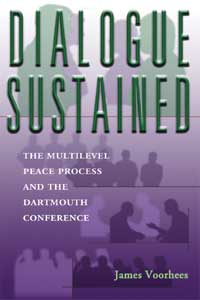Dialogue Sustained: The Multilevel Peace Process and the Dartmouth Conference
 Dialogue Sustained:
Dialogue Sustained:
The Multilevel Peace Process and the Dartmouth Conference
by James Voorhees
Co-published with the Kettering Foundation
The U.S. Institute of Peace and the Kettering Foundation cordially invite you to a Russia–U.S. dialogue on strengthening the Russian--U.S. relationship.
Six veterans of the Dartmouth Conference, the longest continuous bilateral dialogue between American and Soviet/Russian citizen will lead a Russia–U.S. dialogue on such issues as:
- Where is the Russian–U.S. relationship headed?
- What steps by the citizens of the two countries are needed to strengthen the relationship?
- How does the work of the Dartmouth Conference continue, both in the form of task forces such as the nine-year-old "Inter-Tajik Dialogue within the Framework of the Dartmouth Conference," and in the form of citizensí associations seeking to learn how they can engage in building democratic and peaceful relationships?
Featuring
- Vitaly Zhurkin
founding Director, now emeritus, of the Institute of Europe - Nikolai Shmelev
Director of the Institute of Europe - Sergei Rogov
Director of the Institute of USA and Canada Studies - Landrum Bolling
Consultant to international humanitarian organizations - William D. Rogers
Senior Partner, Arnold & Porter, International Law Practice - Harold Saunders
Director of International Affairs, Kettering Foundation and former Assistant Secretary of State.
Opening remarks by Institute President Richard Solomon and Kettering Foundation President David Mathews.
Moderated by Harold Saunders, Director of International Affairs, Kettering Foundation.




